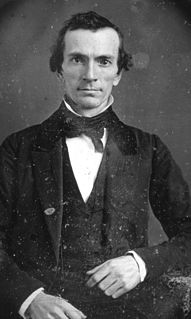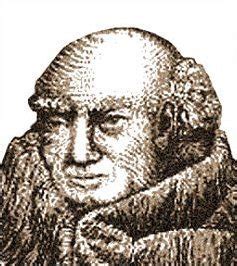A Quote by Pope Benedict XVI
Over the pope as expression of the binding claim of ecclesiastical authority, there stands one's own conscience which must be obeyed before all else, even if necessary against the requirement of ecclesiastical authority.
Related Quotes
The death sentence is a necessary and efficacious means for the Church to attain its end when rebels act against it and disturbers of the ecclesiastical unity, especially obstinate heretics and heresiarchs, cannot be restrained by any other penalty from continuing to derange the ecclesiastical order and impelling others to all sorts of crime ... When the perversity of one or several is calculated to bring about the ruin of many of its children it is bound effectively to remove it, in such wise that if there be no other remedy for saving its people it can and must put these wicked men to death.
The danger of silent accumulations & encroachments by Ecclesiastical Bodies have not sufficiently engaged attention in the U.S. [...] Besides the danger of a direct mixture of Religion & civil Government, there is an evil which ought to be guarded against in the indefinite accumulation of property from the capacity of holding it in perpetuity by ecclesiastical Corporations. [...] The establishment of the chaplainship to Congs. is a palpable violation of equal rights, as well as of Constitutional principles.
Even as he would be guilty of falsehood who would, in the name of another person, proffer things that are not committed to him, so too does a man incur the guilt of falsehood who, on the part of the Church, gives worship to God contrary to the manner established by the Church or divine authority, and according to ecclesiastical custom.
For authority proceeds from true reason, but reason certainly does not proceed from authority. For every authority which is not upheld by true reason is seen to be weak, whereas true reason is kept firm and immutable by her own powers and does not require to be confirmed by the assent of any authority.
[Parental] authority must be tempered...with loving kindness and patient encouragement. To temper authority with kindness is to triumph in the struggle which belongs to your duty as parents...All those who would advantageously rule over others, must as an essential element, first dominate themselves, their passions, their impressions.
I've always believed that everything that is said from authority is either the authority of one's own heart, one's own brain, one's own reading, one's own trust, but not the authority of someone who claims it because they're speaking for God and they know the truth because it's written in a book. That, essentially, is where I come from. In a sense, tolerance is my religion. Reason is my religion.
The judge's authority depends upon the assumption that he speaks with the mouth of others. That is to say, the momentum of his utterances must be greater than any which his personal reputation and character can command, if it is to do the work assigned to it - if it is to stand against the passionate resentments arising out of the interests he must frustrate - for while a judge must discover some composition with the dominant trends of his times, he must preserve his authority by cloaking himself in the majesty of an overshadowing past.
Anarchism, in my view, is an expression of the idea that the burden of proof is always on those who argue that authority and domination are necessary. They have to demonstrate, with powerful argument, that that conclusion is correct. If they cannot, then the institutions they defend should be considered illegitimate. How one should react to illegitimate authority depends on circumstances and conditions: there are no formulas.
Above this race of men stands an immense and tutelary power, which takes upon itself alone to secure their gratifications, and to watch over their fate. That power is absolute, minute, regular, provident, and mild. It would be like the authority of a parent, if, like that authority, its object was to prepare them for manhood; but it seeks, on the contrary, to keep them in perpetual childhood.




































